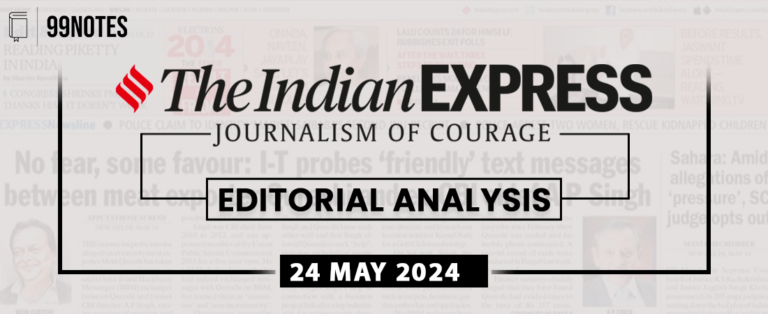27 Feb 2024 : Indian Express Editorial Analysis
Indian Express Editorial Analysis
27-February-2024
1. It starts with the district
| Topic: GS2 – Governance – Government policies – Interventions for development in various sectors This topic is relevant for both Prelims and Mains in the context of understanding the diverse socio-economic and cultural landscape of India’s districts. |
| Context: |
|
District Development Index for Maharashtra: A Multidimensional Approach:
- The District Development Index for Maharashtra offers policymakers a nuanced understanding of district-level progress by considering both the potential for socio-economic development and the current levels of development.
- This index provides a comprehensive snapshot of district performance, enabling policymakers to identify areas of improvement and harness the untapped potential present in various districts across the state.
Population Dynamics: Governance Challenges and Opportunities:
- With an average district population of nearly 1.86 million people, larger than the populations of entire countries like Singapore and the UAE, governance at the district level becomes immensely complex.
- However, strides in socio-economic indicators, such as education and financial access, demonstrate notable progress made at the district level, highlighting the need for localized policy interventions.
Inter-district Disparities: Insights from Data Analysis:
- Studies conducted shed light on inter-district variations in developmental outcomes, showcasing instances of both progress and disparity across different states.
- Such analyses are crucial for policymakers to identify areas requiring targeted intervention and to ensure equitable development across all districts.
Income Disparities and Urban-Rural Divide:
- Evidence from reports like the Competitiveness Roadmap for India underscores significant income disparities across districts, with urban districts disproportionately contributing to economic activity.
- Addressing these disparities requires a nuanced approach that considers both top-down policies and bottom-up initiatives tailored to the specific needs of each locality.
Policy Responses: Balancing Top-Down and Bottom-Up Approaches:
- Effective policy responses must strike a balance between top-down initiatives aimed at addressing broader socio-economic challenges and bottom-up interventions tailored to local contexts.
- Initiatives like the Aspirational Districts Programme exemplify efforts to address critical gaps and foster collaboration among stakeholders to target localized challenges in health, education, agriculture, and other key sectors.
Harnessing District-level Potential: Towards Clusters of Growth:
- Unlocking district-level productivity and value creation necessitates moving beyond one-size-fits-all policies.
- Schemes like the One District One Product programme aim to leverage local resources and expertise to promote economic growth at the district level.
- Additionally, creating linked industries and institutions within industrial clusters can catalyze value creation and foster sustainable growth.
Conclusion:
- As India strives for inclusive and sustainable development, it is imperative for policymakers to recognize the diversity of its districts and tailor interventions accordingly.
- By harnessing localized data, fostering collaboration, and implementing targeted policies, districts can emerge as drivers of growth, contributing to the vision of a developed and equitable India.
| PYQ: Mention core strategies for the transformation of aspirational districts in India and explain the nature of convergence, collaboration and competition for its success. (250 words/15m) (UPSC CSE (M) GS-1 2018) |
| Practice Question: Discuss the significance of understanding India’s district-level diversity in policymaking and development initiatives. How can localized indices like the District Development Index contribute to crafting effective policies? (250 words/15 m) |
2. Instead of electoral bonds
| Topic: GS2 – Polity – Judiciary This topic is relevant for both Prelims and Mains in the context of understanding the implications of judicial decisions on governance and electoral processes. |
| Context: |
|
Analysis of Supreme Court Verdict: Implications and Legal Context:
- The Supreme Court’s judgment underscores the longstanding principles governing corporate funding in Indian politics, as outlined in the Companies Act.
- While companies were permitted to donate to political causes under certain conditions, such as generating profits and obtaining appropriate board resolutions, the essence of disclosure was never compromised.
- However, amendments introduced by the impugned law distorted these fundamental principles, perpetuating inequalities and undermining transparency.
Broader Implications of the Judgment: Towards Systemic Reform:
- Beyond the legal intricacies, the judgment prompts a broader reflection on the motives behind legislative initiatives and their alignment with stated objectives.
- The EBS, purportedly introduced to enhance transparency in electoral funding, paradoxically fostered a culture of secrecy.
- Justice Sanjiv Khanna’s dissent emphasizes the importance of legislative intent and cautions against ulterior motives such as retribution or retaliation.
Institutional Integrity and Government Oversight:
- The judgment also raises concerns about the integrity of institutions tasked with safeguarding public interest.
- Contradictory stances from entities like the Reserve Bank of India (RBI) and the Election Commission underscore the need for independent scrutiny and vigilance.
- The refusal to stay the EBS highlights the erosion of the right to information and the encroachment on democratic values by governmental authorities.
Challenges to Democratic Processes and Electoral Integrity:
- A critical aspect highlighted in the judgment is the potential for the EBS to distort electoral processes and disenfranchise smaller political parties.
- The infusion of unregulated funds threatens to undermine the democratic fabric by favoring entrenched interests and marginalizing alternative voices.
- The judgment’s implications for the prevalence of cash-based funding and the role of money in shaping voter behavior warrant careful consideration.
Future Prospects and Legislative Reforms:
- Looking ahead, the annulment of the EBS presents an opportunity for systemic reform in political funding.
- However, merely rescinding the scheme may not suffice to restore a level playing field.
- Collaborative efforts involving all stakeholders are imperative to devise alternative mechanisms that uphold democratic values and ensure transparency in political finance.
Conclusion:
- The impending unveiling of truth carries significant implications for India’s democratic ethos and governance.
- The Supreme Court’s verdict underscores the imperative of legislative accountability and the preservation of democratic principles.
- As the nation awaits further developments, the onus lies on the new Parliament to enact laws that reflect the spirit of judicial scrutiny and uphold the integrity of India’s democratic framework.
| What are Electoral Bonds? |
About:
Donations Through Electoral Bonds:
Eligibility to Receive Funds via Electoral Bonds:
|
| PYQ: To enhance the quality of democracy in India the Election Commission of India has proposed electoral reforms in 2016. What are the suggested reforms and how far are they significant to make democracy successful? (250 words/15m) (UPSC CSE (M) GS-2 2017) |
| Practice Question: Critically analyze the implications of the recent Supreme Court verdict on the Electoral Bonds Scheme (EBS) for transparency and accountability in India’s electoral process. Discuss the broader significance of the judgment in upholding constitutional principles and democratic values. (250 words/15 m) |
For Enquiry

27 Feb 2024 : Indian Express Editorial Analysis

26 Feb 2024 : Daily Current Affairs Quiz

26 Feb 2024 : Daily Answer Writing

26 Feb 2024 : Daily Current Affairs

26 February 2024 : The Hindu Editorial Notes PDF

26 February 2024 : PIB Summary for UPSC

26 Feb 2024 : Indian Express Editorial Analysis

Administrative Unification under the British Empire

24 Feb 2024 : Daily Current Affairs Quiz

24 Feb 2024 : Daily Answer Writing
Indian Express 27 Feb 2024 : Indian Express Editorial Analysis Indian Express Editorial Analysis
27-February-2024
1. It starts with the district
Topic: GS2 – Governance…
Daily Quiz 26 Feb 2024 : Daily Current Affairs Quiz 26 Feb 2024 : Daily Quiz…
mains answer writing 26 Feb 2024 : Daily Answer Writing Mains Answer Writing
26-February-2024
Q1) “Amidst the clamor of competing interests, the government’s…
Daily Current Affairs 26 Feb 2024 : Daily Current Affairs Daily Current Affairs
26-February-2024- Top News of the Day
1. Assam Government Moves to Repeal Outdated…
Feb 2024 The Hindu 26 February 2024 : The Hindu Editorial Notes PDF The Hindu Editorial
26-February-2024
1. The Raisina Dialogue lacked diversity in conversations on foreign…
feb 2024 PIB 26 February 2024 : PIB Summary for UPSC PIB Summary for UPSC
26 February -2024
1. INDIA-JAPAN JOINT EXERCISE ‘DHARMA GUARDIAN’ COMMENCES IN…
Indian Express 26 Feb 2024 : Indian Express Editorial Analysis Indian Express Editorial Analysis
26-February-2024
1. In poll year, a data question
Topic: GS2 – Governance…
Modern India Administrative Unification under the British Empire Administrative Unification under the British Empire
The establishment of the British Empire allowed not…
Daily Quiz 24 Feb 2024 : Daily Current Affairs Quiz 24 Feb 2024 : Daily Quiz…
mains answer writing 24 Feb 2024 : Daily Answer Writing Mains Answer Writing
24-February-2024
Q1) “The true function of a legislature is to discuss and…


